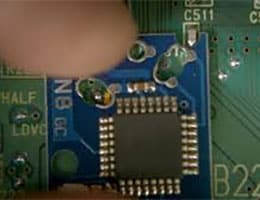 The term minuscule comes from the Latin word minuscŭlus . The notion refers to that which is very small or has little importance .
The term minuscule comes from the Latin word minuscŭlus . The notion refers to that which is very small or has little importance .
For example: "My husband noticed a tiny scratch on a front door of the car and he went crazy because he likes his vehicle to be spotless," "The surgery left a tiny mark above my navel," "You can't worry so much about a "tiny inconvenience."
The minuscule, therefore, is something of reduced size , whether physical or symbolic. Microbes , for example, are tiny living beings : they can only be observed through a microscope . Being so small, it is impossible to detect them with the naked eye.
In the case of the first example, we are dealing with a relatively ambiguous use of the term, since the man finds a tiny scratch but nevertheless becomes angry. This leads us to think that its magnitude is not important, because your desire is to see your car in perfect condition.
Having said that, what does the use of this word give us, therefore, in a context where size does not affect the facts? On the one hand, it can serve to emphasize the man's obsession with the state of his vehicle, but also for the sender to express her lack of understanding of her husband's reaction, as a complaint about his attitude .
Regarding the second example, the person expresses that after the operation he simply has a tiny mark left, probably in a tone of satisfaction for not having a large scar. You could also say the same thing without using an adjective, but rather several words that denote its small size or its irrelevance: "The scar is almost imperceptible," "The mark is so small that it is only noticeable if you look at it closely."
A town that has an area of twenty hectares and has twelve inhabitants, on the other hand, can be described as tiny. The concept is linked to its limited geographical extension and the small number of people who live there.
Let's see how problems can be classified according to their magnitude. An illness, the loss of a family member or losing a job are serious disorders; On the other hand, getting your hair messed up because of the wind or losing a treat are tiny inconveniences . Logic indicates that it is absurd to worry or anguish over minor difficulties.
 A lowercase letter , meanwhile, has a different shape than the uppercase letter, being smaller than it. The lowercase letter is the letter commonly used in writing; Capital letters, on the other hand, are used only in specific cases (such as at the beginning of each sentence or at the beginning of proper nouns).
A lowercase letter , meanwhile, has a different shape than the uppercase letter, being smaller than it. The lowercase letter is the letter commonly used in writing; Capital letters, on the other hand, are used only in specific cases (such as at the beginning of each sentence or at the beginning of proper nouns).
Therefore, the rules of our language require us to begin sentences and proper names with a capital letter; However, for stylistic reasons we can ignore them. A clear example is found in the names of various brands, such as yahoo! and eBay , which we must write with a lowercase initial.
There are many synonyms for lowercase , especially because we can create or modify words to express this idea if we are talking to trusted people. The size of things is one of the first properties that we appreciate in childhood; Adults often use invented words or simplify existing ones to talk to babies, and then endless variations arise for concepts such as "big", "small", "hot", "cold", etc.
Formally, dictionaries offer us the following synonyms: minimal, tiny, inmost , small and insignificant . But we can say tiny, tiny, lilliputian and invisible , among many other options. Regarding antonyms, we have big, giant and capital .
